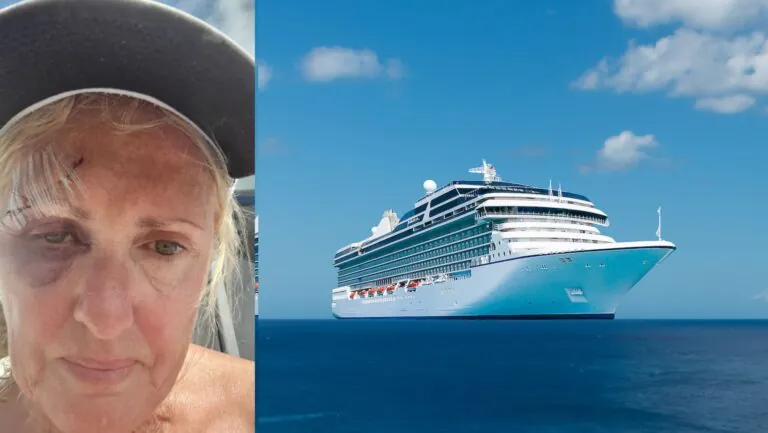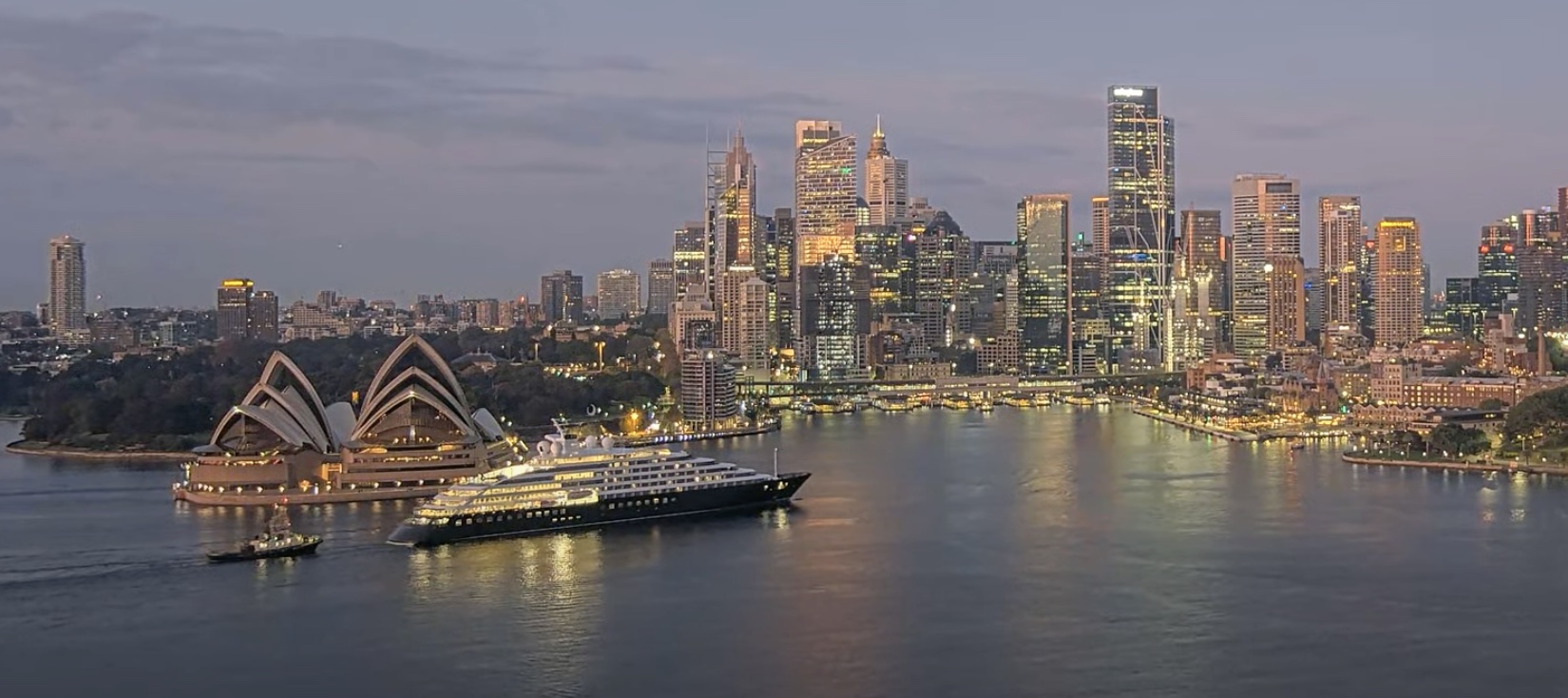Australian legal experts are concerned about the rights of passengers’ to take action in the event of an accident as more and more cruise lines try and stipulate where they can they fight their cases in contract clauses.
But should a cruise line be able to exclude local courts and consumer law from presiding over what happens on the seas close to its coast line, or even in its territorial waters?
The debate has come to light after a New Zealander woman celebrating her 60th birthday fell while leaving a bar on a voyage around Asia.
Kathryn Rackett wanted to seek legal recourse after falling on a step, and then alleging that her injuries were misdiagnosed and poorly handled, which led to medical complications and the need for treatment. However, after approaching a law firm, she was told she would have to take legal action in Switzerland, where the cruise line is headquartered.
In the terms and conditions of purchasing her cruise which was purchased from an Australia and New Zealand cruise brochure, and paid for in Australian dollars, the contract states that any legal action must be taken in a Swiss court.
This is not an uncommon dilemma as nearly all cruise lines are registered overseas. So they introduce what are called a “forum selection clause,” and it often designates a specific country or court, sometimes tied to the ship’s registered domicile.
Cruise lines argue that it simplifies legal processes, ensures consistency, and can be more cost-effective to handle disputes in a single location. Imagine a ship with passengers from dozens of countries – applying different laws for each case would be a logistical nightmare.
Many major cruise lines, including Carnival, Royal Caribbean, and Norwegian, often favour Florida courts in their contracts, regardless of where the ship is flagged or where the passenger embarked.
The legality and enforceability of these clauses are complex and varies depending on several factors, including the law in your home country. The United Kingdom courts, for instance, recently found such cases involving tickets bought in UK pounds at a UK registered business were covered by the UK courts.
The High Court of Australia recently ruled that “unfair” contract terms, including forum selection clauses, can be voided under Australian Consumer Law, even if the contract was formed overseas. This provides some protection for Australian passengers.
Are cruise lines allowed to do this?
According to Victoria Roy of Victory Travel & Cruise Lawyers, who is representing Rackett, the answer is yes, but exceptions can exist.
Cruise lines can state that any legal proceedings must be actioned in a certain place, but if Australians can establish strong reasons why an action should be brought here, the court does not have to enforce the clause.
It is very common for cruise lines to include a clause in their terms and conditions that designates a specific country or court for legal action. This is often the country where the ship is flagged, but not always.
However, it obviously makes seeking legal recourse more difficult for passengers who are not from the country in which the legal proceedings must take place.
Carnival Cruise Line, Royal Caribbean and Norwegian Cruise Lines frequently designate Florida courts, regardless of the ship’s flag. However, Carnival, Royal Caribbean and MSC state that legal proceedings will happen in Australian courts for Australian passengers.
Viking designates the courts of Switzerland.
Roy told Cruise Passenger: “Clauses that stipulate which jurisdiction a claim should be litigated in if there is a dispute are common in contracts. In Australia, those clauses are called exclusive jurisdiction clauses.
“In consumer contracts, the goods or service provider often chooses a jurisdiction which is most favourable or convenient to them, like where their headquarters is. However, there are other considerations such as whether local consumer laws give consumers the right to bring a claim in their home jurisdiction.”
Some lines have conceded the UK as a place of juristiction.

Why Australian law is lacking
Roy explains that the reason why cruise contracts in places such as the United Kingdom allow for court proceedings to take place locally in the United Kingdom is that those countries have laws that protect against exclusive jurisdiction clauses. Whereas Australia does not.
“The reason for the different terms and conditions for passengers from different countries is that in some jurisdictions such as the European Union and England and Wales, exclusive jurisdiction clauses forcing consumers to travel long distances, use unfamiliar procedures and potentially conduct litigation in a foreign language are considered unfair and void.
“However, the Australian Consumer Law does not specifically list exclusive jurisdiction clauses as being unfair contractual terms. Instead, Australian consumers have to demonstrate “strong reasons” for an Australian court not to enforce a foreign exclusive jurisdiction clause if the consumer wants to bring a claim here in their home court.”
Roy believes that Australian law should adapt to exclude these clauses and allow Australian citizens to fight claims in their own countries.
“In my view, the Australian Consumer Law is letting consumers down by not listing foreign exclusive jurisdiction clauses as unfair contractual terms that are automatically void.
“For as long as the Australian Consumer Law permits goods and service providers like cruise lines to have foreign exclusive jurisdiction clauses in their contracts, passengers, therefore, need to carefully read the cruise lines’ terms and conditions to see how the cruise line will deal with claims if something goes wrong.”
Kathyrn Rackett will attempt to fight her claim in Australia
Roy’s law firm has opted to file a claim in the Federal Court of Australia, arguing that the case should be able to be heard in Australia.
Roy says: “Although Mrs Rackett is a New Zealander, she purchased her voyage from the cruise line’s Australia office in Australian dollars after selecting her cruise from the cruise line’s brochure for Australian and New Zealander customers.
“This case highlights the importance of consumers reading the fine print of their travel contracts. The cruise line’s Australian and New Zealander customers might be surprised to discover that it stipulates in their contracts that claims must be brought in Switzerland under Swiss law. However, we are determined to fight this claim in Australia.
“If consumers who buy services in Australia have to go abroad to enforce their Australian consumer rights, the Australian Consumer Law cannot serve its purpose of protecting consumers.”
What happened to Kathryn?
Rackett had been watching a live band in a lounge and fell while leaving the venue. Her immediate injuries were a pain in her left elbow and a seven-centimetre laceration across her face.
However, when Rackett returned to New Zealand, she claims she was informed by local doctors that her injuries were more severe. She says that she was told she had a double displaced fracture in her elbow, for which she would have an elbow replacement. Furthermore, she was told there were glass fragments in her wounds, which she would have cosmetic surgery to remove.
Rackett decided to take legal action, and her law firm Victory Travel & Cruise Lawyers has filed a claim in the Federal Court of Australia claiming that the step in the lounge breached Australian Consumer law because of inadequate lighting, not being properly marked and not having fitted handrails or warning signs.
She is also alleging that the cruise line’s medical treatment were “not provided with due care and skill”.
It is also worth noting that Rackett did have travel insurance, which covered any onboard expenses. However, it didn’t cover further expenses such as loss of earnings and further medical expenses as the injuries required more treatment.
The warnings for others from her story are:
- Read the fine print: Always carefully review the terms and conditions before booking.
- Seek legal advice: If you have concerns about a forum selection clause, consult with a lawyer specializing in consumer law or maritime law.
- Make sure you have adequate travel insurance










No travel insurance?
And if she was over the limit the laywers will be laughing
I fractured my leg whilst stepping out of the bathroom into the hallway whilst on a cruise ship. The doctor was totally negligent in the way he handled my injury and the senior officers on board never approached me once, I was ignored and I had to find my own way to an emergency room on shore to get a cast fitted. I didn’t sue, my insurance covered most of the costs, nevertheless we will never sail with this company ever, and other guests on board were horrified at my treatment by the staff that some cancelled their future bookings.